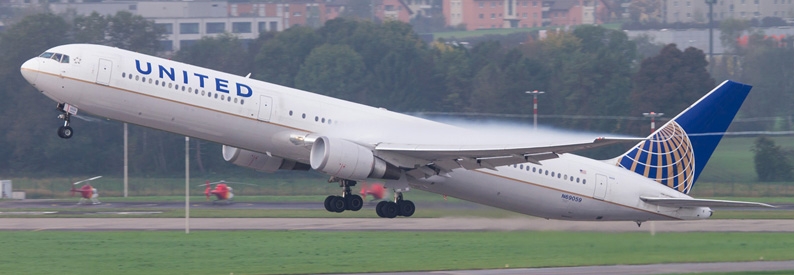United Airlines Flight Makes Emergency U-Turn After Passenger’s Laptop Falls Into Cargo Hold

A United Airlines flight from Washington Dulles to Rome was forced to make an unexpected mid-flight U-turn on October 15, 2025, after a passenger’s active laptop slipped through the cabin and fell into the aircraft’s cargo hold — creating a potential lithium battery fire hazard that pilots deemed too risky for a transatlantic flight.
United Airlines Flight 126, operated by a Boeing 767-400ER, had been in the air for less than an hour when the crew contacted air traffic control approximately 100 miles southeast of Boston to report the incident. The aircraft was carrying passengers on its scheduled eight-hour journey to Rome’s Fiumicino Airport.
“A passenger on the airplane had a laptop that they dropped somewhere, and it’s now missing somewhere inside the airplane, and we need to recover it before we can go across the pond,” the pilot told Boston Center controllers, according to recordings published by aviation monitoring service You Can See ATC.
The laptop had reportedly fallen through a cabin sidewall into the cargo pit area, making it completely inaccessible to the crew — and crucially, outside the aircraft’s built-in fire suppression system.
Lithium Battery Safety Drives Emergency Decision
The crew’s decision to return was guided by strict safety protocols involving lithium-ion batteries, which can overheat or ignite if damaged. The pilots informed controllers that the laptop was “not even near the suppression system we have for fires down there,” emphasizing the potential danger.
“This is just out of abundance of caution and just precautionary, you know, due to the lithium battery in the cargo area,” the pilot explained to ATC. While no formal emergency was declared, the crew prioritized safety and diverted the flight back to Dulles.
The aircraft landed safely at 12:35 a.m. local time, where ground crews located and retrieved the missing device. Flight 126 later departed again for Rome, ultimately arriving about five hours behind schedule.
Growing Concerns Over Lithium Battery Hazards
The incident underscores growing concern across the aviation industry about lithium battery-related risks. According to Federal Aviation Administration (FAA) data, there have been 620 verified lithium battery incidents in U.S. airspace between March 2006 and April 2025 — with numbers steadily rising since 2014.
Of those, 465 incidents occurred in passenger cabins and 129 in cargo holds, often involving phones, battery packs, or e-cigarettes. In 2025 alone, 22 incidents were reported through May, averaging roughly two battery-related events per week on U.S. flights.
Lithium-ion batteries can enter “thermal runaway”, a chain reaction that generates extreme heat, gas, and fire — conditions that are exceptionally difficult to contain aboard aircraft. In confined cargo areas without adequate fire suppression coverage, such events can escalate quickly.
“These batteries can overheat and go into thermal runaway, a chain reaction that can lead to extreme heat and fire that is difficult to extinguish,” according to FAA safety documentation. The risk is especially severe when batteries are lodged in areas beyond the crew’s reach.
Airline and Industry Safety Protocols
Airlines maintain strict protocols for any lithium battery incident. When a device becomes inaccessible — especially in a zone lacking fire suppression — standard safety procedure requires immediate diversion and recovery.
Air traffic controllers handling Flight 126 noted they had “never heard anything like that before,” underscoring how unusual it was for a passenger’s device to physically drop into a cargo compartment rather than being trapped within a seat.
Recent Battery-Related Aviation Incidents
United’s precaution follows several similar incidents in recent months. A Lufthansa flight made an emergency landing in Boston earlier this year when a tablet began overheating in the cabin, while an Air China passenger’s power bank caught fire mid-flight in October.
In response to these risks, Southwest Airlines recently introduced a new policy requiring all active portable chargers to remain in plain sight during flight, enabling crew to detect overheating batteries more quickly.
Passenger Safety Responsibilities
Experts emphasize that passengers should secure all electronic devices during takeoff and landing and immediately notify flight attendants if a device falls into an inaccessible area. Attempting to retrieve it can crush or puncture the battery, potentially triggering thermal runaway.
Flight attendants receive specialized training to handle such incidents safely, and passengers are strongly advised not to attempt retrieval themselves.
Setting a New Safety Precedent
United Airlines’ decision to return demonstrates the aviation industry’s proactive approach to lithium battery safety. By choosing caution over convenience, the crew set a precedent for how airlines will handle similar incidents in the future.
As personal electronics continue to proliferate, this case serves as a reminder of both the hidden dangers of modern battery technology and the robustness of aviation safety systems designed to protect passengers and crew alike.
The safe recovery of the laptop — and the flight’s eventual arrival in Rome — highlights that while the challenges of lithium power remain real, vigilance and preparedness continue to keep air travel among the safest forms of transportation in the world.
Related News: https://airguide.info/?s=united+airlines, https://airguide.info/category/air-travel-business/travel-health-security/
Sources: AirGuide Business airguide.info, bing.com, reuters.com
